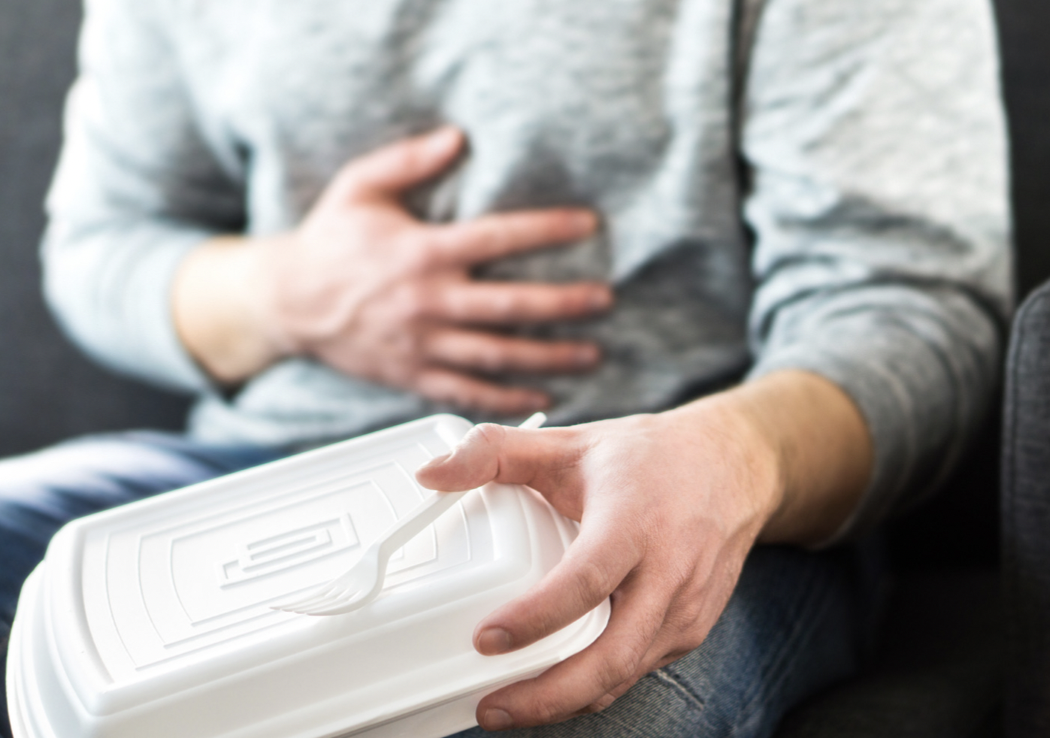Definisi
Irritable bowel syndrome (IBS) atau sindrom iritasi usus besar adalah kondisi yang mengenai sistem pencernaan dan menyebabkan gejala seperti kram perut, kembung, diare dan sembelit (konstipasi). Gejala cenderung hilang timbul dan dapat berlangsung selama beberapa hari hingga bulan. Apabila mengalami kekambuhan, gejala IBS dapat menganggu aktivitas. IBS merupakan penyakit yang bersifat lama (kronis), sehingga penanganannya membutuhkan terapi untuk waktu yang lama.
Penyebab
Penyebab pasti dari IBS belum diketahui, namun IBS sering kali dikaitkan dengan proses makanan yang masuk ke dalam saluran pencernaan (terlalu cepat atau terlalu lambat), serabut saraf yang sensitif di usus, paparan stres, dan riwayat IBS di dalam keluarga. Pada pasien dengan IBS, terdapat gangguan antara usus dengan reseptor saraf di otak, yang menyebabkan usus menjadi sangat sensitif dan menimbulkan gejala. Beberapa riset juga menunjukkan seseorang dengan IBS memiliki pertumbuhan jumlah bakteri yang lebih banyak dibandingkan dengan orang normal. Penyebab lainnya adalah:
- Infeksi yang berat: Misalnya diare yang disebabkan oleh bakteri atau virus. Pasien IBS juga diperkirakan memiliki pertumbuhan bakteri usus yang tidak seimbang
- Paparan stres dari usia yang muda
- Perubahan bakteri baik didalam usus
Faktor Risiko
IBS lebih sering terjadi pada populasi sebagai berikut:
- Usia muda, sering terjadi pada usia dibawah 50 tahun
- Berjenis kelamin perempuan
- Memiliki riwayat IBS di dalam keluarga
- Memiliki riwayat gangguan mental seperti kecemasan, depresi, riwayat menjadi korban kekerasan atau kekerasan seksual
Gejala
Gejala umum dari IBS, yaitu:
- Adanya nyeri perut disertai dengan rasa kram atau kembung yang berkait dengan pergerakan usus
- Perubahan dalam pola pergerakan usus, peningkatan gas atau terdapatnya lendir di dalam tinja
Beberapa jenis IBS yang diketahui yaitu:
- IBS dengan sembelit: menyebabkan tinja memiliki konsistensi yang keras dan padat
- IBS dengan diare: menyebabkan tinja menjadi cair dan banyak mengandung air
- IBS dengan gejala pencernaan campuran: pada hari yang sama, tinja dapat memiliki konsistensi yang keras dan cair
Pada pasien dengan IBS, otot di usus cenderung lebih sering berkontraksi dibandingkan dengan orang normal. Kontraksi yang berlebihan menyebabkan nyeri perut dan kram perut. Pasien dengan IBS juga memiliki toleransi terhadap nyeri yang lebih rendah.
Diagnosis
Pada pertemuan pertama dokter akan melakukan pemeriksaan awal untuk menilai riwayat kesehatan dan pemeriksaan fisik. Pertanyaan yang mungkin ditanyakan adalah:
- Apakah Anda merasakan nyeri yang berkaitan dengan pergerakan usus?
- Apakah ada perubahan dalam pola BAB dan bentuk tinja?
- Seberapa sering gejala ini timbul?
- Kapan gejala pertama kali dirasakan?
- Pengobatan apa saja yang sudah Anda konsumsi?
- Apakah sebelum ini anda memiliki riwayat sembuh dari penyakit serupa?
- Apakah anda mengalami kejadian yang menjadi stresor berat pada hidup Anda?
Pemeriksaan lain untuk mengkonfirmasi diagnosa IBS adalah pemeriksaan laboratorium darah, analisis tinja dan pemeriksaan radiologi berupa x-ray.
Pada beberapa kasus, pasien dengan IBS dapat dianjurkan untuk melakukan kolonoskopi untuk mencari penyebab dari gangguan di sistem pencernaan. Kolonoskopi adalah pemeriksaan untuk melihat keadaan usus besar menggunakan kamera di dalam selang yang dimasukkan melalui lubang dubur. Selain kamera, pemeriksaan ini juga dapat mengambil jaringan atau mengangkat polip.
Tata Laksana
Hingga saat ini belum ada terapi yang dapat menyembuhkan seseorang dengan IBS sepenuhnya. Terapi difokuskan untuk meredakan gejala saat kambuh. Perubahan gaya hidup yang dapat diterapkan pada penderita IBS adalah:
- Menghindari makanan yang dapat menyebabkan IBS kambuh
- Mengonsumsi makanan yang mengandung serat yang tinggi
- Mengonsumsi banyak cairan
- Berolahraga secara teratur
- Tidur yang cukup
Dokter dapat menyarankan pasien untuk menghindari beberapa jenis makanan seperti makanan yang mengandung kandungan gas yang tinggi atau minuman berkarbonasi. Pada beberapa kasus penggunaan probiotik dapat membantu meredakan gejala IBS.
Komplikasi
IBS dapat berlangsung untuk waktu yang lama, diare atau sembelit (konstipasi) terus menerus dapat menyebabkan seseorang mengalami hemoroid atau wasir. Selain itu komplikasi IBS yang lain adalah:
- Kualitas hidup yang rendah, gejala IBS yang berulang sering membuat seseorang tidak dapat masuk untuk bekerja tiga kali lipat dibandingkan dengan orang yang tidak memiliki IBS
- Kelainan mood atau suasana hati: pasien dengan IBS dapat mengalami kecemasan atau depresi. Gangguan kecemasan dan depresi ini yang dapat memperparah kondisi IBS yang sudah ada
Pencegahan
Pencegahan IBS sangat berkaitan dengan pola makan dan gaya hidup. Penyebab IBS kambuh bagi setiap orang dapat berbeda-beda, sehingga mengingat makanan atau kejadian sebelum IBS kambuh dapat membantu seseorang untuk menghindari pencetus tersebut.
Beberapa jenis makanan yang diketahui dapat membuat gejala IBS memberat, adalah:
- Roti dan beberapa jenis sereal
- Makanan yang diproses seperti biskuit
- Minuman seperti kopi, minuman berkarbonasi dan alkohol
- Diet tinggi protein
- Produk hasil olahan susu seperti keju
Pola makan yang disarankan untuk pasien dengan IBS sembelit (konstipasi) dan IBS diare berbeda. Pada pasien dengan IBS sembelit:
- Disarankan untuk mengkonsumsi yang mengandung serat secara teratur sebanyak 2-3 gr per hari
- Mengurangi makanan yang mengandung kadar gula yang tinggi
- Mengkonsumsi banyak air setiap hari
Pola makan yang disarankan untuk pasien dengan IBS diare adalah:
- Mengurangi konsumsi serat dan menambah makanan yang padat seperti roti, nasi atau pasta
- Tidak mengonsumsi makanan yang mempunyai temperatur yang berbeda dalam sekali makan seperti mengonsumsi sup yang hangat didampingi dengan air minum yang dingin
- Menghindari makanan yang menghasilkan banyak gas seperti brokoli, bawang dan kol. Makanan lain yang dapat membuat perut kembung adalah brussel sprouts, seleri, dan kismis
- Mengonsumsi makanan dalam jumlah yang lebih kecil namun sering
- Minum air satu jam sebelum makan
Hindari makan terlalu cepat dan menunda makan. Hindari makanan yang mengandung tinggi lemak, pedas atau makanan yang diproses. Hindari mengonsumsi lebih dari 3 porsi buah atau lebih dari 240 g buah.
Kapan Harus ke Dokter?
Jika Anda mengalami nyeri perut disertai dengan tanda-tanda dibawah ini segera pergi ke dokter untuk mendapatkan pertolongan pertama:
- Nyeri perut hebat yang belum pernah dirasakan sebelumnya, disertai dengan nyeri seperti dirobek atau disayat.
- Disertai dengan demam atau muntah darah
- Nyeri perut pada saat sedang hamil
- Muntah terus menerus
- Nyeri muncul secara tiba-tiba
- Nyeri dirasakan bertambah berat
- Trauma pada daerah perut
Anda juga dapat mengunjungi dokter jika perubahan pola makan dan obat tidak membantu dan meringankan gejala.
Mau tahu informasi seputar penyakit lainnya? Cek di sini, ya!
- dr Ayu Munawaroh, MKK
- Khatri, M. (2022). Irritable Bowel Syndrome (IBS) Triggers and Prevention. WebMD.
- Irritable bowel syndrome (IBS) - Diet, lifestyle and medicines. nhs.uk. (2022).
- Irritable bowel syndrome - Diagnosis and treatment - Mayo Clinic. Mayoclinic.org. (2022).
- Irritable Bowel Syndrome: IBS, Symptoms, Causes, Treatment. Cleveland Clinic. (2020).
- IBS: Symptoms, Causes, Diagnosis, Triggers, and Treatment. Healthline. (2017).
- Colonoscopy - Mayo Clinic. Mayoclinic.org. (2020).
- Branstetter, Mary DNP and Garrett-Wright, Dawn PhD (2017) "Practice Matters: Red Flags in Evaluating Adult Abdominal Pain," International Journal of Faith Community Nursing: Vol. 3 : Iss. 1 , Article 5.












